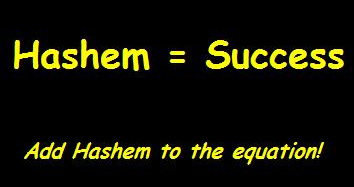
Including Hashem
They call themselves “religious,” but they explode when things don’t go their way. Instead of including Hashem in their lives, they hit their heads on another wall...

Hashem has been sending me some interesting conversations recently, where I’ll mention that Hashem runs the world, only to be ‘silenced’ with the retort that nothing will happen if we humans don’t make our own effort. The conversations usually go something like this:
Them: “I want to do / have [fill in the blank]. To that end, I’m going to do x, y and z.”
Me: “The most important thing is to make Hashem part of the equation, and ask Him to help you.”
Them: (cross) “See, that’s the difference between you and me. You think you can just sit back and expect G-d to do everything for you. You can’t – life’s not like that. You have to make the effort – G-d expects us to make the effort, and not just rely on Him for everything.”

Me: “Of course we should make a reasonable effort, but we also need to ask Hashem to help us. We have to put Hashem in the picture right from the start, and at least acknowledge that without His say-so, nothing is going happen.”
Them: (still cross) “Of course Hashem is in the picture! Just because I don’t make a big show of talking about Him all the time, etc. Of course I know nothing happens without Hashem, but nothing is going to happen if I don’t make the effort.”
At this point, I usually try to change the subject, because it’s plainly clear that Hashem is not in the picture, even if the person eats kosher, keeps Shabbat and is as ‘frum’ as you like. How do I know? I know because I see how irate people get when ‘their’ plan doesn’t work out; how cross they get with the people – and circumstances – that are apparently standing in their way; how frustrated and miserable they are when their expectations aren’t met.
Religious – really? Had they included Hashem in their lives, they wouldn’t be angry, miserable and stressed when their plan didn’t work out; and they wouldn’t be working on their umpteenth million initiative for ‘making an effort’.
Yet, they are right that we are expected to make some sort of effort in this world, and not to rely solely on miracles. Finding the correct balance between personal effort and personal prayer has been an ongoing struggle for me. I’m constantly re-assessing what the correct parameters of this effort should be.
So I was very grateful when Hashem shed a bit of light on the subject for me recently, when I was listening to one of Rabbi Brody’s CDs in English called ‘Income with Emuna’. On it, Rav Brody told a Rebbe Nachman story about a poor peasant, who arrived in a town almost collapsing from hunger and thirst.
The peasant asked a passer-by where he could get something to eat, and was told to go to the mansion on the hill. He gets there, and sees there are two mansions. He knocks on the door of one, and is ushered in. The peasant explains that he is about to keel over from hunger and thirst, and the owner of the house puts an axe in his hand, and tells him that if he’ll go outside and chop the big pile of wood, he’ll get something to eat afterwards.
The peasant works for hours chopping the wood; he comes back to the owner of the house and is sent over the road to the second mansion, where there’s a free soup kitchen.
He’s served his bread and soup, which he quickly finishes, and then bangs the table yelling that he’s worked so hard, he deserves to have far more to eat and drink.
The soup kitchen attendant comes over to him, and says: “Sir, there you worked for free. And here, you eat for free.”
* * *
I’ve had to learn about the limitations of ‘effort’ the hard way. When my business was going downhill a few years back, I tried everything I could think of – except turning to Hashem – to turn it around. The more marketing, networking and spending I did, the more the business slid down the pan.
By the end of a tough and frustrating year, I finally started to get the picture that my effort wasn’t responsible for the business’s previous success (I ‘ate’ for free) and that my increased efforts weren’t going to stop the business failing, if that is what G-d had decreed (I ‘worked’ for free).
But the other thing I started to recognise is that ‘effort’ doesn’t just mean running around trying to drum up new business, or track down the latest ‘cure’, or whatever the case may be; it can and should also mean spiritual effort.
Let me give a practical example: a few months ago, my husband and I were running a little low on funds. My husband could have spent weeks or even months networking and flying all over the place, trying to find new clients and new sources of income, but instead, he decided to invest six hours of his time doing hitbodedut at the Kotel, asking Hashem to ease our finances.
A couple of weeks’ later, we got money from two unexpected sources that covered all our expenses, and also gave us a bit left over to do our garden. Thank you Hashem!
Putting G-d in the picture doesn’t just mean deciding on a course of action, and then belatedly asking Him to deliver what we want. It means asking Him for guidance in the first place to want the right things. Letting go of our egos like this – admitting that we really can’t do anything on our own – is a very humbling experience. But it’s also a very freeing experience.
Now that I know I’m eating for free, I put most of my efforts in knocking on the right door – via hitbodedut – and far less of my time banging my head against brick walls.
May Hashem bless Am Yisroel that we should all realise that we are eating for free, and that instead of killing ourselves with overtime, stress and ‘effort’, we should put more effort into thinking about what Hashem really wants us to be doing with our lives, and more time into our mitzvahs, our families and our prayers.












7/23/2009
So true This is just so true. Thank you for reminding me!
7/23/2009
This is just so true. Thank you for reminding me!